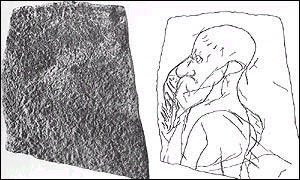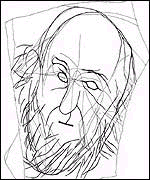(Clearwisdom.net) The oldest lifelike drawing of human faces uncovered in a cave in southern France over 50 years ago did not gain much attention due to doubts to their authenticity. (Image: Faces carved on the floor of a cave at La Marche)

According to BBC news on May 28, one German scientist, Dr Michael Rappenglueck, of Munich University, says it is time the pictures were reassessed. And there could be other surprises awaiting archaeologists, he believes, when they look not at the walls of prehistoric painted caves, but at the floor.
Extraordinary wonders

Some pictures are difficult to interpret
The faces on this page were discovered carved on the floor of a cave at La Marche in the Lussac-les-Chateaux area of France. The cave system was discovered in 1937 by French scientist Leon Pencard, who excavated it for five years. Over 1,500 slabs were found on which images were etched.
The pictures are difficult to interpret. Sometimes several images are superimposed on one another. But to the trained and expectant eye they reveal extraordinary wonders. From the La Marche caves there are lions, bears, antelope, horses - and 155 lifelike human figures.
These images of "real people" may date back 15,000 years. If correct, this would make them far older, for example, than the symbolic face recently recognized, carved into a rock at Stonehenge.
Hidden treasures
"They have been completely overlooked by modern science," Dr Rappenglueck told BBC News Online. "They were mentioned in a few books many decades ago and dismissed as fakes - and since then nothing."
The portraits were carved into limestone slabs that were then carefully placed on the floor. However, it has sometimes been asked why the animals painted on the walls of such caves are so much more lifelike than the human forms depicted with them. Could it be because the more sophisticated human pictures were placed on the floor, asks Dr Rappenglueck?
If so, such treasures on the floors of other prehistoric caves may have been accidentally destroyed. One of the first things that archaeologists used to do when examining such caves was to level and strengthen the floor, not thinking that what was under their feet could be just as significant as what was on the cave walls.
?ref: http://news.bbc.co.uk/hi/english/sci/tech/newsid_2012000/2012385.stm)
Category: Perspective








